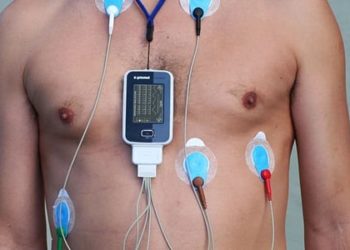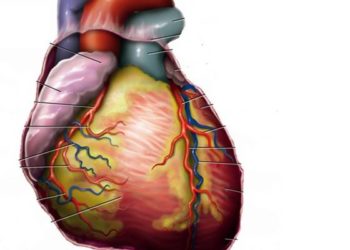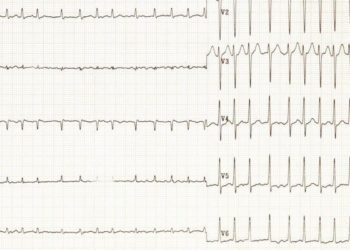Rivaroxaban associated with significantly increased risk of major ischemic or hemorrhagic events versus apixaban in patients with atrial fibrillation
1. In patients with atrial fibrillation over 65, treatment with rivaroxaban compared to apixaban was associated with a significantly increased risk of major ischemic or hemorrhagic events.
2. Patients receiving reduced doses of anticoagulants had increased relative and absolute risk of major ischemic or hemorrhagic events.
Evidence Rating Level: 2 (Good)
Study Rundown: Direct oral anticoagulants such as rivaroxaban and apixaban are the preferred anticoagulants for ischemic stroke prevention in patients with atrial fibrillation However, their comparative efficacy is unknown. This cohort study compared major ischemic and hemorrhagic outcomes in patients with atrial fibrillation who initiated anticoagulation treatment with rivaroxaban or apixaban. The primary endpoint was a composite of major ischemic (stroke/systemic embolism) and hemorrhagic (intracerebral hemorrhage/other intracranial bleeding/fatal extracranial bleeding) events. Secondary endpoints were nonfatal extracranial bleeding and total mortality (fatal ischemic/hemorrhagic event or other death during follow-up). Among 581,451 Medicare beneficiaries aged 65 or older with atrial fibrillation, the adjusted incidence of major ischemic or hemorrhagic events for rivaroxaban and apixaban was 16.1 vs 13.4 per 1,000 person-years respectively, a statistically significant difference. These results suggested that treatment with rivaroxaban compared to apixaban was associated with a significantly increased risk of major ischemic or hemorrhagic events in patients with atrial fibrillation. A limitation of this study was that a substantial proportion of patients discontinued treatment for reasons unrelated to the safety profile of anticoagulants, resulting in potential confounding of the results.
Click to read the study in JAMA
Click to read an accompanying editorial in JAMA
Relevant Reading: Trends and variation in oral anticoagulant choice in patients with atrial fibrillation
In-Depth [retrospective cohort]: This cohort study included 581,451 patients (mean age, 77.0 years; 291,966 [50.2%] women) with atrial fibrillation on rivaroxaban (n = 227,572) or apixaban (n = 353,879) treatment, where 134,393 (23.1%) patients received reduced doses. Patients were followed for up to 4 years between January 2013 to November 2018, for a total of 474,605 person-years of follow-up (median [IQR], 174 [62-397] days). Overall, the adjusted primary outcome rate for rivaroxaban vs apixaban was 16.1 vs 13,4 per 1,000 person-years respectively (RD, 2.7 [95%CI, 1.9-3.5]; HR, 1.18 [95%CI, 1.12-1.24]). Patients on rivaroxaban had increased risk for both major ischemic events (8.6 vs 7.6 per 1,000 person-years; RD, 1.1 [95%CI, 0.5-1.7]; HR, 1.12 [95%CI, 1.04-1.20]) and hemorrhagic events (7.5 vs 5.9 per 1,000 person-years; RD, 1.6 [95%CI, 1.1-2.1]; HR, 1.26 [95% CI, 1.16-1.36]), including fatal extracranial bleeding (1.4 vs 1.0 per 1,000 person-years; RD, 0.4 [95%CI, 0.2-0.7]; HR, 1.41 [95%CI, 1.18-1.70]). The rivaroxaban group had increased risk of nonfatal extracranial bleeding (39.7 vs 18.5 per 1,000 person-years; RD, 21.1 [95%CI, 20.0-22.3]; HR, 2.07 [95%CI, 1.99-2.15]), fatal ischemic/hemorrhagic events (4.5 vs 3.3 per 1000 person-years; RD, 1.2 [95%CI, 0.8-1.6]; HR, 1.34 [95%CI, 1.21-1.48]), and total mortality (44.2 vs 41.0 per 1,000 person-years; RD, 3.1 [95%CI, 1.8-4.5]; HR, 1.06 [95%CI, 1.02-1.09]). Lastly, patients receiving both the reduced dose (27.4 vs 21.0 per 1,000 person-years; RD, 6.4 [95%CI, 4.1-8.7]; HR, 1.28 [95%CI, 1.16-1.40]) and the standard dose (13.2 vs 11.4 per 1,000 person-years; RD, 1.8 [95%CI, 1.0-2.6]; HR, 1.13 [95%CI, 1.06-1.21]) of rivaroxaban had increased risk of the primary outcome.
Image: PD
©2021 2 Minute Medicine, Inc. All rights reserved. No works may be reproduced without expressed written consent from 2 Minute Medicine, Inc. Inquire about licensing here. No article should be construed as medical advice and is not intended as such by the authors or by 2 Minute Medicine, Inc.







